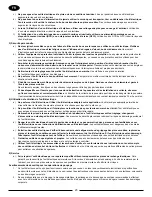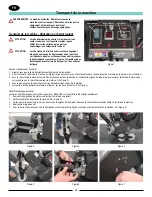
11
DANGER:
Sanding/finishing wood floors can create an
environment that can be explosive. Cigarette lighters,
pilot lights and any other source of ignition can create
an explosion when active during a sanding session.
All sources of ignition should be extinguished or
removed entirely if possible from the work area.
DANGER:
Work areas that are poorly ventilated can create an
explosive environment when certain combustible
materials are in the atmosphere, i.e., solvents,
thinners, alcohol, fuels, certain finishes, wood dust and
other combustible materials. Floor sanding machines
can cause flammable material and vapors to ignite.
Read the manufacturer’s label on all chemicals used
to determine combustibility. Keep the work area well
ventilated.
DANGER:
Sanding dust can self ignite and cause an injury or
damage. Remove the contents of the dust bag each
time you finish using the machine. Always dispose of
the dust in a metal container located outside of the
building. Never leave a dust bag unattended with
sanding dust in it. Empty the contents frequently.
Do not empty the contents of the dust bag into a fire.
DANGER:
Hitting a nail while sanding can cause sparks and
create an explosion or fire. Always use a hammer and
punch to countersink all nails before sanding floors.
CAUTION
:
Machine will pull itself forward. Make sure to have
firm control of the operator's handle when lowering the
drum to the floor.
CAUTION
:
Keep people out from in front of machine while in use.
Serious injury could occur.
Operating Instructions
EN
To operate the machine follow this procedure:
1. Before sanding, decide on best approach for sanding desired area.
If the floor is uneven, it may be necessary to sand diagonally to the
direction that the floor is laid. This will help “pull” or stretch low and
high spots in the floor over a greater area, producing a flatter surface.
Preliminary cuts should be performed at angles approximately 15°
to the direction of the wood grain. Cut direction should change on
successive cuts with the final cut performed in the direction of the wood
grain. This will minimize the tendency of waves to form and provide the
most even floor surface.
When sanding the area, work in such a way so that you are moving
away from where the cord set enters the room. This will help to avoid
entanglement with the cord set and eliminate the need to move the cord
set out of the way so frequently.
Work the area in a way that avoids interruption or termination points (an
end of pass). Make long continuous passes.
2. Swing cable arm to side of machine opposite the direction you intend
to work. Rotate elbow on dust pipe until dust bag rests on motor. This
will maintain balance and sanding pressure as the dust bag fills. The
machine should be operated with the dust bag in this position whenever
possible.
Figure 22
Figure 19
Figure 20
Figure 21
Summary of Contents for 07236A
Page 1: ...Belt Sander Legend Operator s Manual...
Page 2: ...2...
Page 20: ...20...
Page 39: ...39 Wiring Diagram...
Page 64: ...64 Transport Dolly Assembly RF083000 022421 1 3 4 2 8 5 7 6 TRANSPORT DOLLY ASSEMBLY...
Page 68: ...68...
Page 70: ...70...
Page 71: ...71...












































